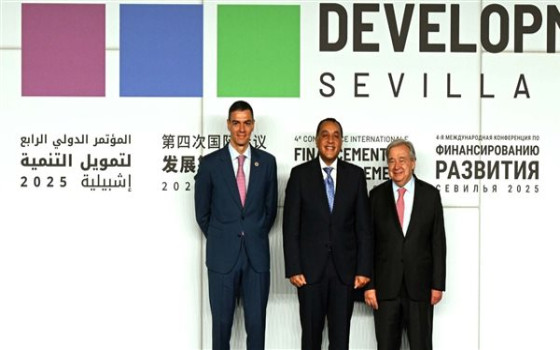
Fairer taxes for the wealthy to curb inequality: Key international calls at the Seville Conference on Financing for Development

- Europe and Arabs
- Wednesday , 2 July 2025 15:45 PM GMT
Seville: Europe and the Arabs
Spain and Brazil have launched a joint initiative aimed at collecting higher taxes from the world's wealthy. This initiative aims to address growing inequality by ensuring that the very wealthy pay their fair share of taxes.
The proposal, presented at the Fourth International Conference on Financing for Development, held this week in Seville, highlights a growing problem: the wealthiest individuals often contribute less to public finances than ordinary taxpayers, thanks to low effective tax rates and legal loopholes.
"Our countries need more public revenue to meet their needs. Inequality is a problem everywhere, and the wealthy pay less than the middle class—and even less than low-income taxpayers," said Spain's Secretary of State for Finance, Jesús Gascón, during a press conference at the conference venue.
The two governments are calling on others to join the campaign for a fairer and more progressive global tax system. They point to a stark reality: the richest 1 percent of the world's population owns more than 95 percent of humanity's combined wealth. Sharing Knowledge, Bridging Gaps
In today's interconnected world, access to reliable data is essential. The initiative prioritizes information sharing—between governments and tax authorities—to help uncover gaps in tax systems, close legal loopholes, and combat tax evasion.
Improving data quality and building national data analysis capacity will help tax administrations identify where and how wealth is concentrated, how much is currently being paid, and what needs to change. While some progress has already been made, countries say more needs to be done and more countries should join.
"There is a real need to know who the beneficial owners are behind the companies and legal structures used to hide wealth," said Mr. Gascón. The initiative also proposes technical cooperation, training in data analysis, and peer review mechanisms to strengthen national tax systems.
A Global Wealth Register?
Spain and Brazil are currently considering steps toward a global wealth register—recognizing that this will require time, political will, and significant national effort. But the goal is clear: more transparency, more accountability, and fairer contributions from the wealthy.
Brazilian Minister José Gilberto Scantucci denied that these proposals represent a far-left agenda: "We cannot tolerate the severity of inequality, which has increased in recent years. This is a moderate initiative to confront a very radical reality."
The proposal forms part of the Seville Platform for Action, which promotes voluntary actions to help achieve the Sustainable Development Goals, which remain far from meeting the 2030 deadline.
G20
This also follows the G20 2024 Agreement signed in Rio de Janeiro, Brazil, last year – the first international agreement to commit to a common tax agenda for high-net-worth individuals.
A three-month action plan is now being developed, with regular meetings scheduled to track progress. The goal: to engage more countries, international organizations, and civil society to push for tax reforms targeting the ultra-wealthy. Mr. Gascón added: "If we want to effectively tax the very wealthy, combat inequality, and make our tax systems fairer and more progressive, we need political will—and we need to work within our means."












No Comments Found